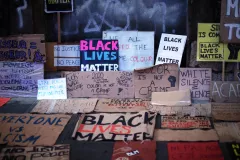
A Statement from the Berkman Klein Center Board of Directors
With the killing of George Floyd still a raw and open wound, our nation must grapple with a harrowing and growing list of Black people whose lives have been tragically ended, provoking outrage, unimaginable pain, and widespread global protests against racial injustice.
The BKC Board of Directors has been grieving, listening, and learning in the wake of these events. We share today some initial thoughts with the community about how our Center can respond and grow in this moment of both deep heartbreak and extraordinary energy dedicated toward lasting change. We offer some immediate thoughts with the hope that many of you will join us in the longer-term work that will be necessary to act upon our individual and institutional commitments to antiracism and to a more just society.
We are not alone in our fervent hope that this time will be different from others when systemic racial injustice has commanded widespread attention. That work means addressing how our Center’s docket, educational and funding priorities, and emergent research can more fully embody a commitment against the many manifestations of racism in society. We must embrace more intentionally our strength and breadth as a global network and platform to affirm the worth of all Black people and people of color in our community across all subject matters of their work.
The work ahead will be both outward- and inward-facing. Because of our visibility and our networks, as well as the Center’s past work, what we do, say, and choose to prioritize matter in ways that give us an obligation to make clear that we commit to antiracism and reject any false pretense of neutrality on the subject.
The digital world that draws the time and expertise of each of us can seem a place of endless possibilities, but we know also that it too often reflects and propels patterns and problems in our physical world. We will do the work of naming these problems and working to resist or solve them. We are dedicated to examining the role of technology in reinforcing bias, reflecting the interests of those in power, and replicating or expanding inequities. And we want to redouble support, in particular, for those among us who work on uses of technology in criminal justice, policing, and surveillance, and in gatekeeping and opportunity structures. We will inform, influence, and empower policies, code, and law that make it more likely that all people of conscience can work in concert to tackle injustice. We are encouraged by the voices and analyses of many in our networks and others across the globe in saying: no more; now is the time for change.
From our own reflections and from suggestions from many of you and others, we know there is much to do. Our immediate action steps include the following:
- In 2017, in large part thanks to community prompts, BKC began a stipend program to support community members underrepresented in fields related to Internet and society, who contribute to the Center’s diversity and have financial need. We will thoroughly review and strengthen that program. As a start, we expect that — by matching institutional resources and seeking additional donations — we can generate more stipend funding for the upcoming academic year.
- We will pursue additional fundraising efforts in support of researchers focusing on tech and racial justice issues, broadly defined.
- We will mindfully review the Center’s slate of institutional research projects. We aspire for the Center’s work to advance the public interest in its many forms. Achieving a positive impact on issues of racial justice, and supporting the interests of the disenfranchised, are in the public interest. We want to be certain that the work we are doing lives up to our aspirations.
- We are committed to, and will pursue every opportunity to, improve the diversity of our community at all levels.
- Using resources from a recent grant award, we will create a workstream that addresses racial disparities in the impact of COVID-19, including its disproportionate effect on Black and other traditionally marginalized communities.
- We will finance and launch a new educational program for the next academic year, under the umbrella of the Global Network of Internet & Society Research Centers, on the topic of technology, equity, and justice.
- We commit to transparent and meaningful community engagement on questions about what the Center’s future actions can and should be. This includes fostering opportunities for critical dialogues, and taking steps to minimize the possibility that administrative or other structures within the Center stifle debate or disagreement. We will propose new ways to bring the thinking and activities of the Center’s extraordinary community closer to that of its formal faculty leadership.
The road ahead for us individually, collectively, and institutionally holds many unknowns. We look forward to walking, working, and leading with you as we pursue the crucial and immediate task of building a society that is enduring in its insistence on justice for all – in a world that is increasingly affected by digital technology. We resolve to create a world among us of possibility and joy, one where each of us can attain our highest potential and be our truest selves.
The Berkman Klein Center Directors
Christopher Bavitz
Yochai Benkler
John Deighton
William Fisher
Urs Gasser
Martha Minow
Charles Nesson
Felix Oberholzer-Gee
Ruth L. Okediji
Jeffrey Schnapp
Margo I. Seltzer
Stuart Shieber
Rebecca Tushnet
Mark Wu
Jonathan Zittrain
Photograph by Annette Dubois/Flickr